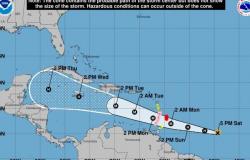“In April I unsubscribed from the prepaid plan, so they will not return the excess amount charged in 12 installments. Who should I complain to? How do those of us who unsubscribed claim to be paid that difference?” Marisa Ducci’s concern this Wednesday on the X network counts in the same sentence two realities: true confusion that still remains in people after two months of tension between the prepaid health insurance companies and the Government, and that there is indeed a sector of the population that in this new context of price increases is canceling its coverage.
As for the first thing – the return of money to former members -, the Superintendence of Health Services (SSS) has already reported – after the advance of Clarion– that interested persons must make a claim to your ex prepaidwho must make the corresponding refund, and if there is any type of resistance from the company, file a complaint with the SSS.
As for the second, the prepaid drip It is already observed in several jurisdictions in the country and it would be one of the factors that has made the demand in public hospitals. To this variable we must add the number of people who lost their jobs and, consequently, social work or medical coverage by triangulating contributions to a prepaid plan.
Clarion In the last few hours he finished surveying the list of ten prepaid most important that have communicated their increases for July -first month without the CPI stocks- and the increases on average almost they double the latest inflation rate known -corresponding to the month of May- of 4.2 percent. The average of the ten surveyed yields the 7.69 percent. Although some of the companies set the increases before May was known. That is, with April, whose CPI was 8.8 percent.
He Top 10 increases The figures were as follows: Hospital Italiano, 9.37%; Sancor Salud, 8.9%; Accord Salud, 8.8%; Hospital Británico, 8.65%; Omint, 8.5%; Medicus, 8.07%; Galeno; 7.45%; Swiss Medical, 6.7%; Hospital Alemán, 6.3%; and Medifé, 4.2%. OSDE -the prepaid health insurance company with the most members in the country- is not yet known about the July increase, as it charges monthly and is expected to announce the increase next month.
To what extent are these increases causing a spill into the public subsystem of health? Clarion He spoke with several provinces that illustrated the dimension of the phenomenon. The common denominator in the districts is clear: what is seen is newly the beginning something that could grow even more in the coming months.
Sources from the City Health Ministry told this medium: “We see a increase in demand in public hospitals, although it is not yet significant. It must also be said that it is all quite recent and we will have to see how it continues. What we do know is that in national numbers it was seen that lost 3 percent of prepayment. “When all those people get sick, they will go to the public system.”
In the province of Buenos Aires they told a slightly different film. The sources from the Ministry of Health consulted said that “the evolution of demand in the guards in 46 Provincial Hospitals, in the last closed month -April- 2024, recorded an increase in consultations per guard of one 18 percent (212,877) in relation to the same month of the previous year.” They added that “although there is no single hypothesis of the increase in care, it is observed that there are people with and without social work/prepaid coverage.”
There is more viruses and bacteria circulating as a possible translation of the greater number of consultations in public hospitals? According to the National Epidemiological Bulletin, so far this year there have been a reduction in all respiratory diseases of mandatory notification with respect to last year and a increase in dengue cases.
In Mendoza they reported an increase in demand in public hospitals in the 15 percent. Sources from the provincial government attributed this to the fact that “as a result of the crisis, people stopped paying prepaid bills and they did not have some specialties in their cards.”
These changes in the scenario in the health system began to be seen after DNU 70from last December, which deregulated prepaid prices and allowed companies to increase without limit. Then, faced with quotas that rose more than 150 percent from January to April, the Government and Justice intervened to begin to stop the -and the- curve.
The official logic of changes in the system
Now that this entire conflictive chapter has concluded and things are beginning to settle, the logic that the Ministry of Health pursued with these measures when they were still no one had the confrontation on their agenda with the prepaid ones, nor to the retirees who were already the ones who suffered the most from these increases. At the beginning of what is now a distant March, from Mario Russo’s offices they explained to Clarion the objectives of that plan.
“Starting with the new regulations, prepaid they have the freedom to establish the value of the fee that they consider. This is with the aim of promoting the free competition between the different actors in the system and that the beneficiary can choose freely, with a greater offer,” they stated then.
To add: “There is a diagnosis that cannot be ignored and that comes from more than 30 years agowith financing and operating problems, where the public health system has not been providing good service, which caused retirees who were able to do so they will turn to prepaid in search of better care.”
Then came the link with the public sector: “In this new stage, the frameworks for greater and better competitiveness were generated with the aim of improving the quality of services both from the private sector and in the public sectorredefining the powers of the national and provincial States, and making PAMI management more efficient pouring all its resources into improving its benefits for the benefit of retirees.”
In July a new stage whose course will have to be followed month by month depending on how the Consumer Price Index adjusts, which despite no longer being a ceiling will continue to be a reference for private medical companies. As stated, the ratio between the new fee increase and inflation in May was practically 2 to 1.
That does not necessarily mean that this proportion will be maintained over time – we will have to see how those that matched the April CPI move in August – but it may indicate a trendtaking into account a fact that the prepaid sector maintains as a direction to follow, when they affirm that inflation in the health sector is located 40 percent above of the general average of the economy.







